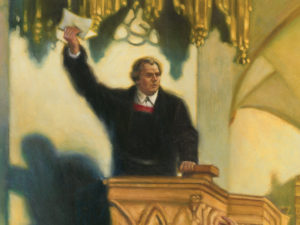 The Lord be with you
The Lord be with you
On Easter Tuesday, 1533, Martin Luther gave a sermon based on Luke 24:36-47. The message had three main points of focus: the disciples thought, at first, that the resurrected Jesus was a spirit; the disciples (and us) are to proclaim repentance and remission of sins in the name of Jesus; and the message should begin in Jerusalem (where all the holiest people were) but spread throughout the world. He concluded the message with:
It seems a simple thing then to obtain forgiveness of sins. You don’t need to carry any stones, or build a church, or have a Mass said; but only hear God’s Word, giving God the glory when he grants us the preaching of repentance; for he is true and we are miserable sinners. Then learn to build upon God’s grace, looking to Jesus’ name, in which forgiveness of sins is preached. He who believes this, sin cannot harm. For forgiveness of sins is greater than all sins; it goes far beyond all sin, and is mightier and stronger than all sin. Therefore, sin cannot harm the one who is in Christ and has forgiveness of sins in his name. As for forgiveness, it is not earned but is a gift by grace. So we are righteous, not as though we had no sin, but because for Christ’s sake, by grace, we are counted righteous by God, even as we pray and confess in the Creed: “I believe in the forgiveness of sins.” For such grace we should thank God that we are in the kingdom of Christ, which is a kingdom of Grace, in which in Jesus’ name all sins in all the world will be forgiven. God grant us his grace to learn this well and avail ourselves of it in salutary manner. Amen.
Eugene F. A. Klug (editor) Sermons of Martin Luther: The House Postils: volume 2 40
Blessings in Christ
Pastor
